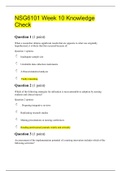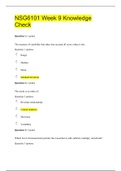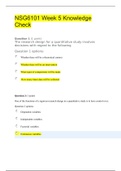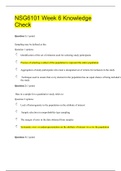NSG 6101 (NSG6101)
California Southern University
All 4 results
Sort by

-
NSG 6101 Week 4 Knowledge Check 2020, NSG6101 Week 5 Knowledge Check 2020, NSG6101 Week 5 Knowledge Check 2020, NSG6101 Week 6 Knowledge Check 2020, NSG6101 Week 6 Knowledge Check 2020, NSG6101 Week 9 Knowledge Check 2020, NSG6101 Week 10 Knowledge Check
- Package deal • 5 items • 2020
-
- $26.49
- + learn more
NSG 6101 Week 4 Knowledge Check 2020, NSG6101 Week 5 Knowledge Check 2020, NSG6101 Week 5 Knowledge Check 2020, NSG6101 Week 6 Knowledge Check 2020, NSG6101 Week 6 Knowledge Check 2020, NSG6101 Week 9 Knowledge Check 2020, NSG6101 Week 10 Knowledge Check 2020/ Satisfaction Guaranteed

-
NSG6101 Week 9 Knowledge Check 2020/ Satisfaction Guaranteed
- Study guide • 2 pages • 2020
- Available in package deal
-
- $10.49
- + learn more
NSG6101 Week 9 Knowledge Check Question 1 (1 point) The measure of variability that takes into account all score values is the: Question 1 options: Range Median Mean Standard deviation Question 2 (1 point) The mode is an index of: Question 2 options: Bivariate relationships Central tendency Skewness Variability Question 3 (1 point) Which level of measurement permits the researcher to add, subtract, multiply, and divide? Question 3 options: Nominal Ordinal Interval...

-
NSG6101 Week 5 Knowledge Check 2020/ Satisfaction Guaranteed
- Study guide • 3 pages • 2020
- Available in package deal
-
- $15.49
- + learn more
NSG6101 Week 5 Knowledge Check Question 1 (1 point) The research design for a quantitative study involves decisions with regard to the following Question 1 options: Whether there will be a theoretical context Whether there will be an intervention What types of comparisons will be made How many times data will be collected Question 2 (1 point) One of the functions of a rigorous research design in a quantitative study is to have control over: Question 2 options: Dependent variab...

-
NSG6101 Week 6 Knowledge Check 2020/ Satisfaction Guaranteed
- Study guide • 3 pages • 2020
- Available in package deal
-
- $10.49
- + learn more
NSG6101 Week 6 Knowledge Check Question 1 (1 point) Sampling may be defined as the: Question 1 options: Identification of the set of elements used for selecting study participants Process of selecting a subset of the population to represent the entire population Aggregation of study participants who meet a designated set of criteria for inclusion in the study Technique used to ensure that every element in the population has an equal chance of being included in the study Question 2 (...

How did he do that? By selling his study resources on Stuvia. Try it yourself! Discover all about earning on Stuvia


